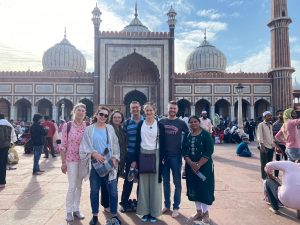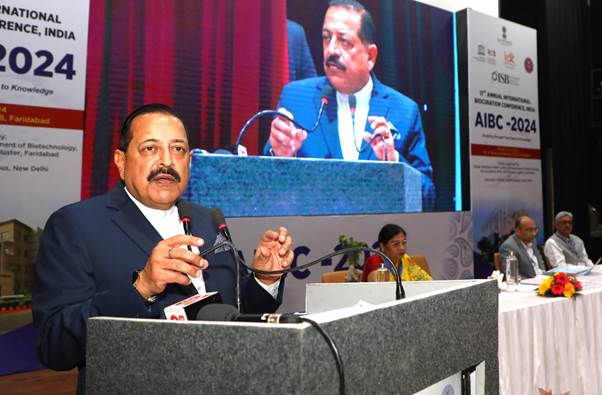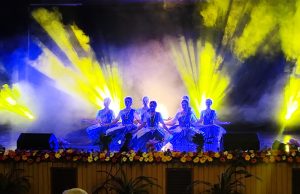AIBC – India. Biocuration, long days, even longer traffic jams.
The Annual International Biocuration Conference (AIBC) was held for the first in India, at the Indian Biological Data Centre (IBDC), Regional Centre for Biotechnology (RCB), Faridabad and co-hosted by the Department of Plant Molecular Biology, University of Delhi South Campus.
As usual, GigaDB had representation at the event (see write-ups of many previous meetings here), Mary Ann Tuli and Chris Hunter. Both of whom were wearing two hats! Mary Ann is also on the Executive Committee of the International Society of Biocuration (ISB) and the conference organising committee, so had various duties during the conference itself including presenting the travel awards. Mary Ann also presented on the trial we have been running with DataSeer investigating the utility of it to us during the pre-peer-review data collection that we routinely perform on manuscripts submitted to GigaScience and GigaByte. Chris donned his Genomic Standards Consortium (GSC) hat to present an update on the work going on there, and both Mary Ann and Chris presented posters of on-going work in GigaDB, and our collaborative work with DOME-ML annotations, respectively.
The days were long, the traffic was epic, the talks were fantastic, the networks will endure!
Sessions covering the wide range of topics that include Biocuration, from the traditional genes and protein centric curation endeavours to the more recent innovations in the field of machine learning (ML) and natural language processing (NLP).
The main conference was preceded with a 1-day workshop aimed at local students, as we were a bit old to be students we took the opportunity to experience some of the culture of Old Delhi; visiting the Red Fort, the Jama Masjid, bazaar and a spice market with a few other participants that also arrived a day early to acclimatise.

Day 1 of the conference kicked off with the usual introductions (including Mary Ann’s introduction to the ISB) followed by a keynote lecture from Guy Cochrane about the INSDC and ENA’s role within it, followed up with talks from the other two INSDC partner organizations; Masanori Arita (DDBJ) and Ilene Karsch Mizrachi (NCBI).
We then had an inauguration ceremony with a very special guest; the Honorable Minister of state Dr. Jitendra Singh (or to give his full title “Hon’ble Minister of State (IC), Ministry of Science & Technology; Minister of State, PMO; Personnel, Public Grievances and Pensions; Department of Atomic Energy; and Department of Space, Govt. of India”!) – See the press release.

Session II was devoted to the Global Biodata Coalition (GBC), introduced by Guy Cochrane, featuring presentations from representatives of two of the 52 Global Core Biodata Resources (GCBRs); Disease Ontology (DO) by Lynn Schriml (Uni Maryland, USA) and Bgee by Frederic Bastian (SIB).
The final session of the day included talks from many of the local organizers own repositories and provided a great insite to the fantastic work being carried out there to bring India into alignment with other well established databases worldwide including; INSACOG– the indian SARS-Cov2 genomics consortium, the Indian Nucleotide Data Resources (INDA) at the IBDC mirroring the INSDC archives to enable better connectivity within India as well as providing data brokering services to the INSDC for Indian submitters. Indian Metabolome Data Archive (IMDA) hosting raw and processed metabolomic data from India.
Just when you thought the day was drawing to an end, the organisers laid on a cultural experience for us. Around 90 minutes of fantastic dance, music and entertainment! A truly amazing experience. Then followed the banquet meal, before the bus journey returning the (now exhausted) participants to the hotel, unfortunately for us, the road back to the hotel also had numerous wedding venues on it which meant what should have been a 20minute journey took well over an hour with an unusual amount of traffic!

Day 2 started with the ISB “Exceptional contribution to biocuration” awardee, Pascale Gaudet (SIB), who gave us her insights and experiences around maintaining curated resources in an evolving knowledge landscape. From her position of 19 years of experience in the business of curation its still clear that people are the key resource in transforming data into knowledge through the addition of metadata. A sentiment echoed by the other speakers in the first session, where despite the obvious trends towards machines doing the analysis, the symantic mappings required by machines need to be added by experienced curators.
After the break, things got complicated. Two parallel sessions each having different length talks in them meant you had to pick a track and stick to it, or risk missing chunks of overlapping talks. Mary Ann’s presentation just before the lunch break outlining our trial with DataSeer to determine whether the NLP tool they provide can help streamline our curation processes was well received by the hungry audience. Watch this space for more news on that.
After the lunch break, in a session dedicated to artificial intelligence (AI) and machine learning (ML), Chris presented on the subject of the Genomic Standards Consortium’s move to using LinkML. Perhaps the fact the title of the talk included the initials ML was why it was placed in that session, but in this case the ML stands for Modelling Language not machine learning! Despite the slightly off-topic nature of the talk the audience appreciated it and could see the link between the need for well curated and accessible metadata for machine learning applications.
The first half of final day of the conference was largely dedicated to the world of proteomics, with presentations from a variety of resources such as UniProt and PDB, as well as AlphaFold.
Unfortunately, Chris had to leave the conference before its conclusion in order to return to the airport, but by all accounts the final half a day didn’t slow down with yet more great talks and ending with a panel discussion, in which Mary Ann took part.
Despite the fact it took 2 hours to transfer from the conference venue back to the hotel in the evenings due to epic traffic jams en-route, overall, the meeting was excellent. In fact, that extra time on the coach in the traffic jams was a way of making new connections with other delegates!
Here’s looking forward to the next AIBC to be held in Kansas USA April 5-9, 2025.